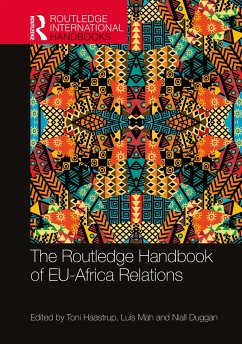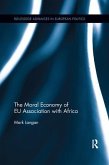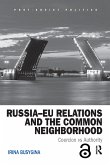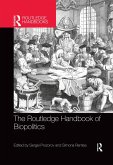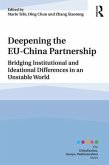The Routledge Handbook of EU-Africa Relations
Herausgeber: Haastrup, Toni; Duggan, Niall; Mah, Luís
The Routledge Handbook of EU-Africa Relations
Herausgeber: Haastrup, Toni; Duggan, Niall; Mah, Luís
- Broschiertes Buch
- Merkliste
- Auf die Merkliste
- Bewerten Bewerten
- Teilen
- Produkt teilen
- Produkterinnerung
- Produkterinnerung
This handbook provides a comprehensive overview of the changing dynamics in the relationship between the African continent and the EU provided by leading experts in the field.
Andere Kunden interessierten sich auch für
![The Moral Economy of EU Association with Africa The Moral Economy of EU Association with Africa]() Mark LanganThe Moral Economy of EU Association with Africa73,99 €
Mark LanganThe Moral Economy of EU Association with Africa73,99 €![The Dynamics of EU External Energy Relations The Dynamics of EU External Energy Relations]() Francesca BatzellaThe Dynamics of EU External Energy Relations63,99 €
Francesca BatzellaThe Dynamics of EU External Energy Relations63,99 €![Russia-EU Relations and the Common Neighborhood Russia-EU Relations and the Common Neighborhood]() Irina BusyginaRussia-EU Relations and the Common Neighborhood64,99 €
Irina BusyginaRussia-EU Relations and the Common Neighborhood64,99 €![Think Tanks in the US and EU Think Tanks in the US and EU]() Christopher James RastrickThink Tanks in the US and EU64,99 €
Christopher James RastrickThink Tanks in the US and EU64,99 €![The Routledge Handbook of Biopolitics The Routledge Handbook of Biopolitics]() The Routledge Handbook of Biopolitics67,99 €
The Routledge Handbook of Biopolitics67,99 €![The Routledge Handbook of the Politics of Brexit The Routledge Handbook of the Politics of Brexit]() The Routledge Handbook of the Politics of Brexit70,99 €
The Routledge Handbook of the Politics of Brexit70,99 €![Deepening the EU-China Partnership Deepening the EU-China Partnership]() Deepening the EU-China Partnership61,99 €
Deepening the EU-China Partnership61,99 €-
-
-
This handbook provides a comprehensive overview of the changing dynamics in the relationship between the African continent and the EU provided by leading experts in the field.
Hinweis: Dieser Artikel kann nur an eine deutsche Lieferadresse ausgeliefert werden.
Hinweis: Dieser Artikel kann nur an eine deutsche Lieferadresse ausgeliefert werden.
Produktdetails
- Produktdetails
- Verlag: Routledge
- Seitenzahl: 398
- Erscheinungstermin: 31. Dezember 2020
- Englisch
- Abmessung: 246mm x 174mm x 21mm
- Gewicht: 706g
- ISBN-13: 9781138047303
- ISBN-10: 1138047309
- Artikelnr.: 60010246
- Herstellerkennzeichnung
- Libri GmbH
- Europaallee 1
- 36244 Bad Hersfeld
- gpsr@libri.de
- Verlag: Routledge
- Seitenzahl: 398
- Erscheinungstermin: 31. Dezember 2020
- Englisch
- Abmessung: 246mm x 174mm x 21mm
- Gewicht: 706g
- ISBN-13: 9781138047303
- ISBN-10: 1138047309
- Artikelnr.: 60010246
- Herstellerkennzeichnung
- Libri GmbH
- Europaallee 1
- 36244 Bad Hersfeld
- gpsr@libri.de
Toni Haastrup is Senior Lecturer in International Politics at the University of Stirling in Scotland, United Kingdom. Luís Mah is Lecturer in Development Studies at ISEG (Lisbon School of Economics and Management), Universidade de Lisboa, Portugal; and an Associate at CEsA (Center for African and Development Studies) at ISEG. He is also a Policy and Advocacy Officer for ACEP (Association for the Cooperation of the People), a Portuguese development NGO. Niall Duggan is Lecturer in the Department of Government and Politics at University College Cork, Ireland.
Introduction PART I: Theorising Africa-EU relations through history
Introduction 1. International Relations theory: Comparative reflections on
EU-Africa relations 2. Regionalism and interregionalism in EU-Africa
relations 3. Applying postcolonial approaches to studies of Africa-EU
relations PART II Evolving governance in EU-Africa relations Introduction
4. From the Treaty of Rome to Cotonou: Continuity and change in the
governance of EU-Africa relations 5. Foreign policy and EU-Africa
relations: From the European Security Strategy to the EU Global Strategy 6.
European External Action Service 7. European Neighbourhood Policy in the
South Mediterranean 8. The evolution of the Joint Africa-EU Strategy (2007-
2019) 9. The African Union as an interlocutor in European Union-Africa
relations? PART III: Issues in EU-Africa relations Introduction 10. EU
development cooperation with Africa: The Holy Grail of coordination 11.
Democracy and human rights promotion 12. Peace and security in the context
of EU-Africa relations 13. Regional integration 14. Interregionalism and
bilateralism in the context of EU-Africa relations 15. Trade and the
Economic Partnership Agreements in EU-Africa relations 16. Africa-Europe
science, technology and innovation cooperation: Trends, challenges and
opportunities PART IV: External actors in Africa's international politics
and the Africa-European Union relationship Introduction 17.
Inter-organisational cooperation in flux? Impact of resources and state
interests in the cooperation between the European Union, United Nations and
African Union 18. The China effect: African agency, derivative power and
renegotiation of EU-Africa relations 19. EU-Brazil-Africa triangular
cooperation in the 21st century: Unfinished business 20. Toward a
post-Westphalian turn in Africa-EU studies? Non-state actors and
sustainable development PART V: Opportunities to cooperate on new global
challenges Introduction 21. Migration and the Mediterranean Sea: A maritime
bridge between the EU and Africa 22. Environment and climate change in the
context of EU-Africa relations 23. The role of civil society in EU-Africa
relations 24. Agriculture and land in EU-Africa relations 25. Gendering
cooperation Conclusion
Introduction 1. International Relations theory: Comparative reflections on
EU-Africa relations 2. Regionalism and interregionalism in EU-Africa
relations 3. Applying postcolonial approaches to studies of Africa-EU
relations PART II Evolving governance in EU-Africa relations Introduction
4. From the Treaty of Rome to Cotonou: Continuity and change in the
governance of EU-Africa relations 5. Foreign policy and EU-Africa
relations: From the European Security Strategy to the EU Global Strategy 6.
European External Action Service 7. European Neighbourhood Policy in the
South Mediterranean 8. The evolution of the Joint Africa-EU Strategy (2007-
2019) 9. The African Union as an interlocutor in European Union-Africa
relations? PART III: Issues in EU-Africa relations Introduction 10. EU
development cooperation with Africa: The Holy Grail of coordination 11.
Democracy and human rights promotion 12. Peace and security in the context
of EU-Africa relations 13. Regional integration 14. Interregionalism and
bilateralism in the context of EU-Africa relations 15. Trade and the
Economic Partnership Agreements in EU-Africa relations 16. Africa-Europe
science, technology and innovation cooperation: Trends, challenges and
opportunities PART IV: External actors in Africa's international politics
and the Africa-European Union relationship Introduction 17.
Inter-organisational cooperation in flux? Impact of resources and state
interests in the cooperation between the European Union, United Nations and
African Union 18. The China effect: African agency, derivative power and
renegotiation of EU-Africa relations 19. EU-Brazil-Africa triangular
cooperation in the 21st century: Unfinished business 20. Toward a
post-Westphalian turn in Africa-EU studies? Non-state actors and
sustainable development PART V: Opportunities to cooperate on new global
challenges Introduction 21. Migration and the Mediterranean Sea: A maritime
bridge between the EU and Africa 22. Environment and climate change in the
context of EU-Africa relations 23. The role of civil society in EU-Africa
relations 24. Agriculture and land in EU-Africa relations 25. Gendering
cooperation Conclusion
Introduction PART I: Theorising Africa-EU relations through history
Introduction 1. International Relations theory: Comparative reflections on
EU-Africa relations 2. Regionalism and interregionalism in EU-Africa
relations 3. Applying postcolonial approaches to studies of Africa-EU
relations PART II Evolving governance in EU-Africa relations Introduction
4. From the Treaty of Rome to Cotonou: Continuity and change in the
governance of EU-Africa relations 5. Foreign policy and EU-Africa
relations: From the European Security Strategy to the EU Global Strategy 6.
European External Action Service 7. European Neighbourhood Policy in the
South Mediterranean 8. The evolution of the Joint Africa-EU Strategy (2007-
2019) 9. The African Union as an interlocutor in European Union-Africa
relations? PART III: Issues in EU-Africa relations Introduction 10. EU
development cooperation with Africa: The Holy Grail of coordination 11.
Democracy and human rights promotion 12. Peace and security in the context
of EU-Africa relations 13. Regional integration 14. Interregionalism and
bilateralism in the context of EU-Africa relations 15. Trade and the
Economic Partnership Agreements in EU-Africa relations 16. Africa-Europe
science, technology and innovation cooperation: Trends, challenges and
opportunities PART IV: External actors in Africa's international politics
and the Africa-European Union relationship Introduction 17.
Inter-organisational cooperation in flux? Impact of resources and state
interests in the cooperation between the European Union, United Nations and
African Union 18. The China effect: African agency, derivative power and
renegotiation of EU-Africa relations 19. EU-Brazil-Africa triangular
cooperation in the 21st century: Unfinished business 20. Toward a
post-Westphalian turn in Africa-EU studies? Non-state actors and
sustainable development PART V: Opportunities to cooperate on new global
challenges Introduction 21. Migration and the Mediterranean Sea: A maritime
bridge between the EU and Africa 22. Environment and climate change in the
context of EU-Africa relations 23. The role of civil society in EU-Africa
relations 24. Agriculture and land in EU-Africa relations 25. Gendering
cooperation Conclusion
Introduction 1. International Relations theory: Comparative reflections on
EU-Africa relations 2. Regionalism and interregionalism in EU-Africa
relations 3. Applying postcolonial approaches to studies of Africa-EU
relations PART II Evolving governance in EU-Africa relations Introduction
4. From the Treaty of Rome to Cotonou: Continuity and change in the
governance of EU-Africa relations 5. Foreign policy and EU-Africa
relations: From the European Security Strategy to the EU Global Strategy 6.
European External Action Service 7. European Neighbourhood Policy in the
South Mediterranean 8. The evolution of the Joint Africa-EU Strategy (2007-
2019) 9. The African Union as an interlocutor in European Union-Africa
relations? PART III: Issues in EU-Africa relations Introduction 10. EU
development cooperation with Africa: The Holy Grail of coordination 11.
Democracy and human rights promotion 12. Peace and security in the context
of EU-Africa relations 13. Regional integration 14. Interregionalism and
bilateralism in the context of EU-Africa relations 15. Trade and the
Economic Partnership Agreements in EU-Africa relations 16. Africa-Europe
science, technology and innovation cooperation: Trends, challenges and
opportunities PART IV: External actors in Africa's international politics
and the Africa-European Union relationship Introduction 17.
Inter-organisational cooperation in flux? Impact of resources and state
interests in the cooperation between the European Union, United Nations and
African Union 18. The China effect: African agency, derivative power and
renegotiation of EU-Africa relations 19. EU-Brazil-Africa triangular
cooperation in the 21st century: Unfinished business 20. Toward a
post-Westphalian turn in Africa-EU studies? Non-state actors and
sustainable development PART V: Opportunities to cooperate on new global
challenges Introduction 21. Migration and the Mediterranean Sea: A maritime
bridge between the EU and Africa 22. Environment and climate change in the
context of EU-Africa relations 23. The role of civil society in EU-Africa
relations 24. Agriculture and land in EU-Africa relations 25. Gendering
cooperation Conclusion

